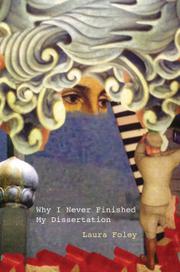https://www.kirkusreviews.com/book-reviews/laura-foley/why-i-never-finished-my-dissertation
WHY I NEVER FINISHED MY DISSERTATION
by Laura Foley
KIRKUS REVIEW
A collection of poetry offers a detailed journey through the author’s past.
“Because I heard the wind / blowing through the sun, / I left the lecture / on mathematics.” These opening lines from the poem “Fractalization” epitomize Foley’s (WTF, 2017, etc.) approach to writing. She has no time for tedium; she refuses to feel trapped; and she is at home and inspired by natural, wide open spaces where individuals “see beyond / the limits” of a mind “numbed by numbers.” Thematically diverse, her poetry is, in every sense, transporting. In “Little Rooms,” she describes herself as a fourth grader, carefully assembling a box to store her collection of gemstones. In “After,” she is a grandmother at a protest march wielding the placard “Queer Grannies Against Trump.” Other poems depict her family—“Rumpelstiltskin” captures her father’s rage when she tells him she is to marry “the hunchback Moroccan,” and the title piece recounts the poet’s first steps into parenthood with a toddler who “sits, / squealing in the mess.” Foley also leads readers through the corridors of a mental health facility, where she recalls visiting her sister: “Quiet as death, / our footsteps echoing against the scarred wood.” The masterful poetry in these pages is replete with elegant lines that beg to be underlined in pencil and returned to repeatedly. For instance, the love poem “Beyond” opens with the beautiful and timely statement: “I don’t think of her as woman, or man, / just as I don’t gender sunlight / on my face the first coatless spring day.” Foley’s writing may appear sparse and reserved but it harbors a subtle power. The poet’s greatest strength is her acute sense of observation. She possesses the ability to thread sensuousness into the fabric of everyday life, as in “What the Dead Miss,” which portrays a visit to a filling station: “I hear music in the liquid trickling, / filling my tank to the brim, / music in my steady footsteps.” After transforming seemingly commonplace sounds into auditory pleasures, she floors readers with the line “They say that’s what the dead miss most, / an ordinary day, spent like this.” This is a dazzling volume of poetry that delights in crisp imagery and tender recollections.
Understated, courageous, and deeply insightful poems.
